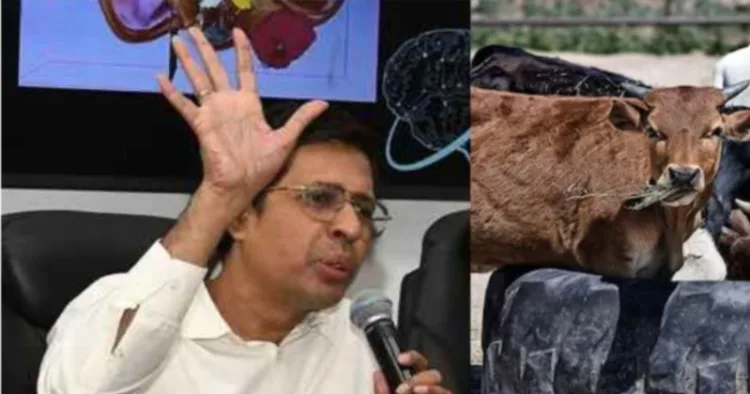CHENNAI: The remarks of IIT Madras Director V Kamakoti on the medicinal properties of cow urine have sparked a heated debate, drawing sharp criticism from some DMK and allied partners while garnering strong support from others. A video of Kamakoti visiting a Goshala (cow shelter) in West Mambalam on Mattu Pongal day (January 15) went viral. In the video, Kamakoti is heard highlighting the anti-fungal, anti-bacterial, and anti-inflammatory properties of cow urine, citing its potential as a remedy for ailments such as irritable bowel syndrome.
கோமியத்தில் நோய் எதிர்ப்பு சக்தி உள்ளது . அதற்கான ஆதாரமும் உள்ளது…
ஐஐடி இயக்குநர் காமகோடி#IIT #IITMadras #IITMadrasDirector #kamakodi #tamiljanam pic.twitter.com/RPMA0wXGqI— Tamil Janam (@TamilJanamNews) January 20, 2025
Kamakoti also recounted an anecdote involving a Sadhu who reportedly recovered from high fever within 15 minutes of consuming cow urine. He emphasized the benefits of indigenous cattle and the use of Panchagavya—a mixture of cow products—for organic farming, an idea strongly supported by Indian organic farming scientist G. Nammalvar.
Dravidian groups, including the Dravidar Kazhagam, dismissed Kamakoti’s comments, labeling them as unscientific and accusing him of lacking scientific temper. DMK cited a study by the Uttar Pradesh Animal Welfare Department’s research center, which purportedly revealed that cow urine contains bacteria and is unfit for consumption.
Critics pointed out what they perceive as hypocrisy, noting that while Kamakoti’s remarks drew ire, similar claims made by Christian pastors or the use of camel urine in other religious contexts do not face comparable scrutiny.
Research Papers and Patents
In defense of his statements, Kamakoti shared five peer-reviewed research papers highlighting the medicinal benefits of cow urine. These include:
- Peptide profiling in cow urine published in Nature (2021) by Rohit Kumar et al.
- A review in the Asian Journal of Pharmaceutical Research (April-June 2020).
- Studies in the International Journal of Recent Advances in Multidisciplinary Research (2017).
- Articles in the Journal of Drug Delivery and Therapeutics (2020) and Journal of Intercultural Ethno-Pharmacology (2015).
- Kamakoti also referred to a U.S. patent issued in 2005 to Indian researchers for bioactive fractions from cow urine distillate.
Support from Prominent Figures
Several prominent individuals and groups came to Kamakoti’s defense.
TN BJP Chief K. Annamalai tweeted, “Kamakoti did not lecture this in a classroom. He has his own views and has the freedom to express them. He did not force anyone to drink Gau Mutra. There is nothing wrong in having faith in religion.”
#JUSTIN | "வகுப்பறைக்கு சென்று ஐஐடி இயக்குநர் சொல்லவில்லையே" – அண்ணாமலை#Annamalai | #BJP | #IITMadras | #IITMadrasDirector #CowUrine | #Kamakoti pic.twitter.com/7nr3Jhw2yX
— PttvOnlinenews (@PttvNewsX) January 19, 2025
Zoho Group Promoter Sridhar Vembu praised Kamakoti, saying, “Modern science is increasingly recognizing the value of our traditional insights. Online mobs are simply channeling their own prejudices.” Tweet Link
Former Telangana Governor Tamilisai Soundararajan remarked, “The Tamil Nadu government fears if people start drinking cow urine, its TASMAC liquor sales will go down. You will eat cow meat but not its urine—why this double standard?”
IIT Madras Director Prof Kamakoti is an accomplished researcher and educator.
He gave citations of scientific papers on the beneficial properties of cow urine. Modern science is increasingly recognising the value of our traditional insights. Online mobs are simply channeling…
— Sridhar Vembu (@svembu) January 21, 2025
TN BJP Vice President Narayanan Thiruppathi highlighted that Kerala’s Left government promotes Panchagavya Kritham, a medicine using cow urine for ailments like jaundice and epilepsy. He criticised Tamil Nadu communists for politicising the issue while Kerala profits from similar products. Tweet Link
Historical Context
Proponents also pointed to historical evidence of cow urine’s medicinal use. Publications such as Organiser detailed how hospitals in the Chola kingdom used Panchagavya as medicine. Stone inscriptions from temple premises corroborate this practice, indicating grants provided by Chola kings for maintaining such hospitals.
The controversy has underscored the cultural and ideological divides surrounding traditional practices in modern science. Kamakoti’s remarks, intended to promote organic farming and traditional wisdom, have become a lightning rod for debates on science, faith, and cultural identity.
While Kamakoti has clarified that his comments were based on scientific studies and were not meant to impose beliefs, the polarised reactions highlight the challenges of balancing tradition with modern scientific discourse.



















Comments